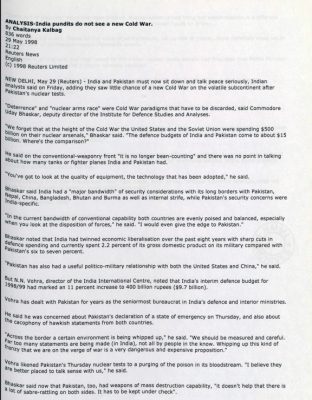Analysis India pundits do not see a new Cold war
[Reuters]
Published date: 29th May 1998
29 May 1998
Reuters News
English
(c) 1998 Reuters Limited
NEW DELHI, May 29 (Reuters) – India and Pakistan must now sit down and talk peace seriously, Indian analysts said on Friday, adding they saw little chance of a new Cold War on the volatile subcontinent after Pakistan’s nuclear tests.
“Deterrence” and “nuclear arms race” were Cold War paradigms that have to be discarded, said Commodore Uday Bhaskar, deputy director of the Institute for Defence Studies and Analyses.
“We forget that at the height of the Cold War the United States and the Soviet Union were spending $500 Gillion on their nuclear arsenals,” Bhaskar said. “The defence budgets of India and Pakistan come to about $15 billion. Where’s the comparison?”
He said on the conventional-weaponry front “it is no longer bean-counting” and there was no point in talking about how many tanks or fighter planes India and Pakistan had.
“You’ve got to look at the quality of equipment, the technology that has been adopted,” he said.
Bhaskar said India had a “major bandwidth” of security considerations with its long borders with Pakistan, Nepal, China, Bangladesh, Bhutan and Burma as well as internal strife, while Pakistan’s security concerns were India-specific.
“In the current bandwidth of conventional capability both countries are evenly poised and balanced, especially when you look at the disposition of forces,” he said. “I would even give the edge to Pakistan.”
Bhaskar noted that India had twinned economic liberalisation over the past eight years with sharp cuts in defence spending and currently spent 2.2 percent of its gross domestic product on its military compared with Pakistan’s six to seven percent.
“Pakistan has also had a useful politico-military relationship with both the United States and China,” he said.
But N.N. Vohra, director of the India International Centre, noted that India’s Interim defence budget for 1998/99 had marked an 11 percent increase to 400 billion rupees ($9.7 billion).
Vohra has dealt with Pakistan for years as the seniormost bureaucrat in India’s defence and interior ministries.
He said he was concerned about Pakistan’s declaration of a state of emergency on Thursday, and also about the cacophony of hawkish statements from both countries.
“Across the border a certain environment is being whipped up,” he said. “We should be measured and careful. Far too many statements are being made (in India), not all by people in the know. Whipping up this kind of frenzy that we are on the verge of war is a very dangerous and expensive proposition.”
Vohra likened Pakistan’s Thursday nuclear tests to a purging of the poison in its bloodstream. “I believe they are better placed to talk sense with us,” he said.
Bhaskar said now that Pakistan, too, had weapons of mass destruction capability, “it doesn’t help that there is a lot of sabre-rattling on both sides. It has to be kept under check”.
Security today was a complex issue at the “macro” level of weapons of mass destruction, the “traditional” level of conventional armed forces, and the “micro” level of factors like fundamentalism, terrorism and narcotics trafficking, he said.
Former prime minister Inder Kumar Gujral, who held office until mid-March, dismissed the Hindu Bharatiya Janata Party-led coalition government’s argument that security considerations had propelled India Into its own tests on May 11 and 13.
“Some sort of jingoistic mood has been created. Nuclearisation is one thing but weaponisation is a different matter; it is a very serious game,” Gujral told parliament’s lower house on Friday.
“We do not want a war. Please let the voice of sanity prevail. Let us talk of peace … India definitely must not in the 50th year of its freedom remain Pakistan’s enemy.”
Vohra said in all the heat and dust raised by the Indian nuclear tests, people had forgotten that Prime Minister Atal Behari Vajpayee headed a fragile minority coalition.
“Sanctions are serious. They will impinge on our economic health. We forget what our own domestic compulsions are in a coalition, with Vajpayee’s partners clamouring for this or that … fertiliser and food subsidies, regional agendas.”
Unless India and Pakistan sat down to talk, Vohra said, “both countries will soon hand themselves over to other forces – to mediators and interlocutors.”
Swaminathan Aiyar, a respected columnist, wrote in the Economic Times: “We have not become a great power on par with the U.S ., we remain on par with lowly Pakistan. We remain two poor countries with delusions of grandeur, close to mutual incineration.”
The Pakistani test has increased the political risk of all investors in the subcontinent, Aiyar said. “Pakistan will become a basket case. India will face higher interest rates and risk premiums abroad, killing some projects. Nervous portfolio investors will flee.”
The neighbours must now ensure they never fight a war, Aiyar wrote. “Without economic strength, they will never be even middling powers, leave alone great ones.”






